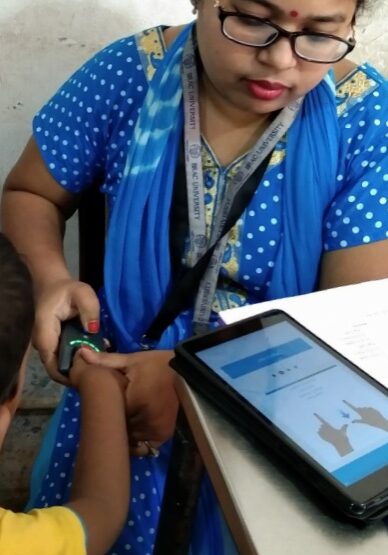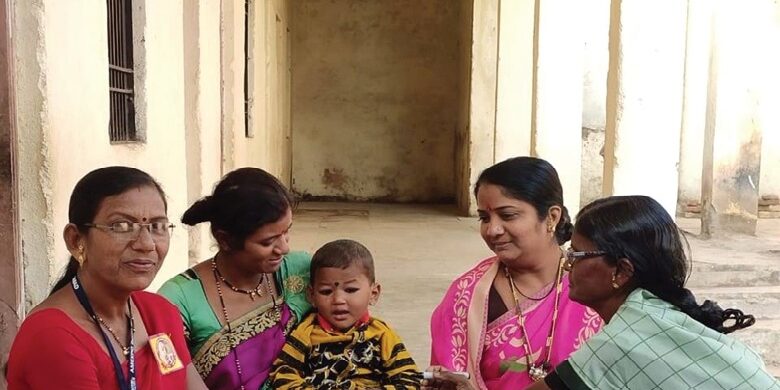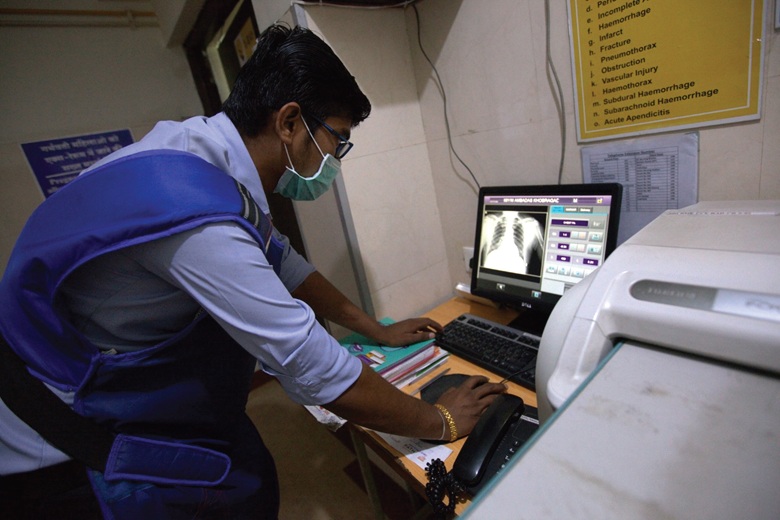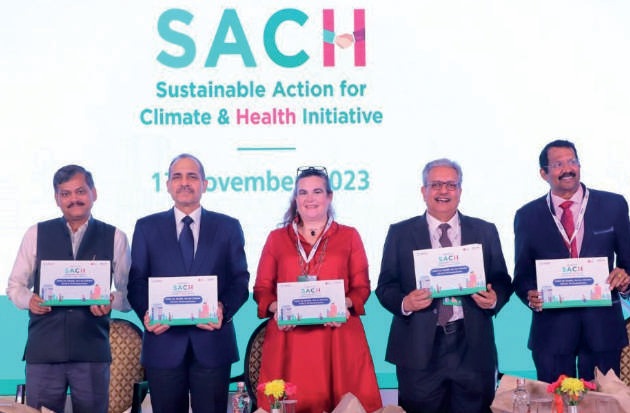Our Focus Areas

The Center for Health Research and Innovation (CHRI) is driving transformative change in healthcare through innovation and partnerships—strengthening health systems, advancing digital technologies, addressing both NCDs and communicable diseases (including TB and HIV), promoting family health, developing innovative products, enhancing pandemic preparedness through a One Health approach, and linking climate change to human resilience—for scalable and lasting impact across India.
Health Systems Strengthening

Building resilient health infrastructures from the ground up, we optimize supply chains, bolster human resources, ensure medical oxygen availability, and upgrade facilities to deliver seamless care. We operationalize Integrated Public Health Laboratories (IPHLs) under the PM-ABHIM and One Health frameworks, performing gap assessments, streamlining operations, and creating Centers of Excellence for cutting-edge diagnostics and training. Our programs equip lab technicians, microbiologists, and frontline workers with hands-on skills in advanced testing, while community surveillance models deploy mobile tools for instant outbreak alerts in partnership with NGOs. We fortify entomological units through assessments, entomologist training, and early warning integrations to sharpen vector control. Deploying state-of-the-art equipment to hospitals and primary centers aligns with NPCDCS for NCD management, complete with maintenance support, referral pathways, and data tools—empowering underserved and tribal areas with equitable, future-proof systems.
Non-Communicable Diseases
From early detection to lifelong management, we confront NCDs like cancer, mental health issues, lifestyle ailments, and rare conditions with innovative diagnostics and community-driven evaluations. Deploying tools such as cervical cancer devices to remote clinics, urban PHCs, and district hospitals in Maharashtra and Manipur, we enhance screening for diabetes, heart disease, and strokes, syncing with national NPCDCS goals. Our evaluations, like those for type-1 diabetes in underprivileged children, draw on caregiver and provider insights to refine interventions and fuel publications. Healthcare teams receive targeted training on device handling and upkeep, amplifying lab services, surveillance, and awareness campaigns that build lasting resilience in hard-to-reach communities.

Communicable Diseases
In the frontline against infections, we fortify immunization drives and sexual/reproductive health services with vigilant surveillance and rapid interventions. Through programs like SSHAKTI, we are reintegrating lost HIV patients, boost viral load testing, and safeguard mother-to-child transmission via NACP-V-aligned care centers. For TB, ultraportable X-ray units with AI-CAD roll out to remote sites, enabling NTEP outreach, radiographer upskilling, and thousands of screenings with data-driven scale-up. Vector control for dengue and chikungunya ramps up ABER, UDSP digital reporting, and malaria CIF adoption—slashing mortality and expanding zero-case zones—fueled by community education, field worker capacity, and cross-sector alliances for swift, effective threat neutralization.
Family Health

By focusing on maternal, newborn, child, and adolescent health; anemia/nutrition; family planning; and geriatric care, we nurture the foundational pillars of family well-being across India's diverse landscapes. In tribal regions like Gadchiroli, Maharashtra, our SHINE project delivers baseline nutritional assessments forchildren under two, launches the "Battery Full" anemia awareness campaign, and co-designs information, education, and communication materials with state health bureaus to engage schools, teachers, parents, and women of reproductive age. We train Community Health Officers in National Quality Assurance Standards (NQAS) and Kayakalp protocols to elevate service delivery, refine referral pathways, and strengthen frontline worker coordination for seamless documentation and support. Through SSHAKTI, we achieve comprehensive coverage for pregnant and postpartum women while ensuring timely testing and viral suppression for HIV-exposed infants, promoting a continuum of care that integrates family planning and geriatric outreach. Impact evaluations, such as those for type-1 diabetes in low-income children, inform scalable interventions in nutrition and caregiving, fostering long-term equity via community-led strategies that empower families to thrive at every age.
Pioneering Digital Health and Emerging Technologies

By integrating digital tools and technologies, data and processes, and emerging technologies including artificial intelligence and robotics for public health innovation, we bridge gaps in access, prediction, and response across India's health ecosystem. Through AMRSense, in collaboration with IIIT Delhi and the Trinity Challenge, we empower community health workers with AI-driven mobile applications for real-time antimicrobial resistance (AMR) awareness and surveillance, building federated data platforms using open-source APIs to enable predictive analytics spanning human, animal, and environmental sectors under One Health principles. This initiative deploys multidimensional AMRaura scorecards for localized trend monitoring and stewardship, earning spotlight in the World Economic Forum's AMR report for its scalable, community-centric approach to curbing resistance hotspots. Complementing this, our SAMRIDH partnership with USAID and IPE Global validates revenue-stage innovations like drone-enabled supply chains for remote deliveries, AI-powered cough analysis for TB screening, telemedicine platforms for underserved consultations, and managed care insurance models—developing comprehensive viability frameworks, securing regulatory approvals, and convening stakeholder workshops to accelerate commercialization and last-mile equity, redefining resilient, tech-infused public health delivery.
Product Development and Innovations
By turning ideas into lifelines, we advance diagnostics, devices, assessments, market entry, and validation to propel breakthroughs from lab to lives. Our BIRAC-backed TB cachexia study in Mizoram and Chhattisgarh blends mixed methods and human-centered design to map prevalence, unpack drivers, and craft interventions, securing ethics, tools, and training for rollout. AI-enhanced X-rays and Odisha IPHL digitals bridge detection gaps, while SAMRIDH tests revenue-ready tech like drones and tools, sharing blueprints at convenings. Campaigns such as "Harega Dengue Haraenge Hum" with Takeda spark climate-smart prevention via mascots, dialogues, and school drives—igniting scalable fixes for overlooked burdens.
Health Security
By weaving together One Health approaches, AMR containment strategies, and crisis readiness, we empower communities to withstand current epidemics and anticipate future health hazards. In Odisha, we have amplified surveillance with mobile apps, training thousands for prompt alerts and upgrading entomological labs with vector tech. AMRSense scorecards pinpoint AMR hotspots for sector-spanning action, as SSHAKTI and dengue efforts hit full UDSP compliance, curbing cases through integrated case tracking. JEET 2.0 widens TB preventive therapy, screening contacts and embedding ASHA incentives into NTEP. SACH rallies 85+ entities with pledges, corporate CSR guides, city MoUs, pro training, and youth mobilization—channeling funds like Takeda's for climate-resilient infectious disease defenses.
Bridging Climate Change and Human Health

Under Climate Change and Human Health, we examine environmental-health intersections for resilient strategies. The USAID-PATH SACH Initiative fosters cross-sectoral collaboration among policymakers, urban bodies, private sector, healthcare facilities, organizations, donors, academics, communities, and innovators to catalyze action through city-level plans, provider training, youth engagement, decarbonization, behavior change campaigns, and ecosystem convening. It onboards 85+ organizations via pledges, develops corporate menus for resilience and CSR, signs MoUs with Mumbai and Bengaluru corporations, trains 100+ professionals, engages 2,000 youth, and supports climate-informed infectious disease themes with Takeda funds. Layering One Health via IPHLs, vector boosts, and alert systems, we counter surges in diseases like dengue, arming tribal groups with real-time tools and drills to preempt climate-fueled outbreaks and nurture thriving, hazard-ready futures.
Contact Us
If you would like to partner us to accelerate healthy equity, please email us.
